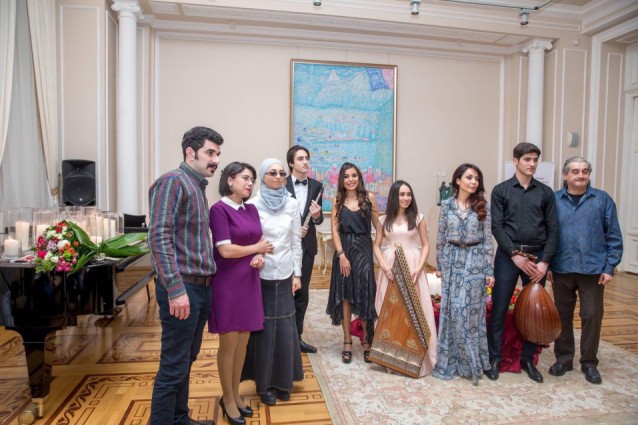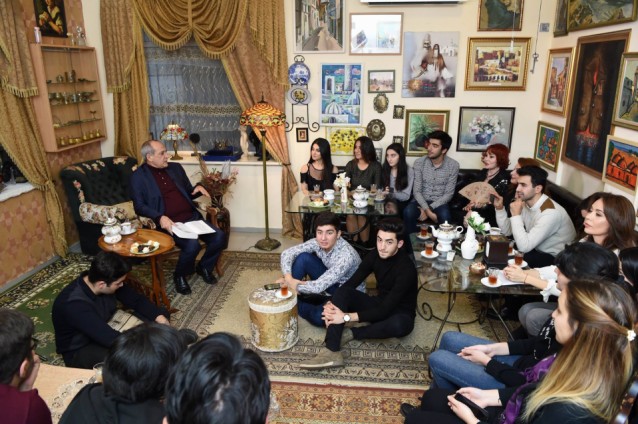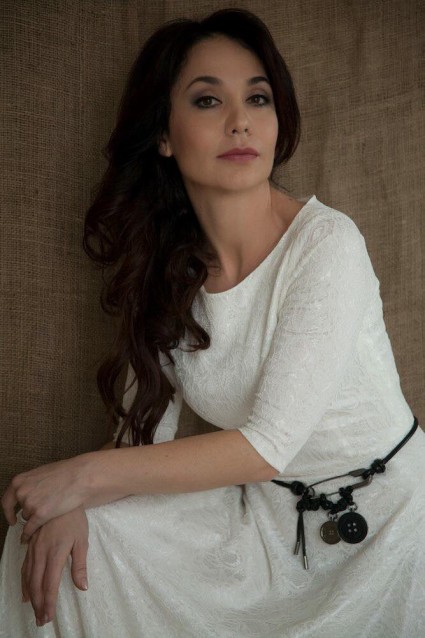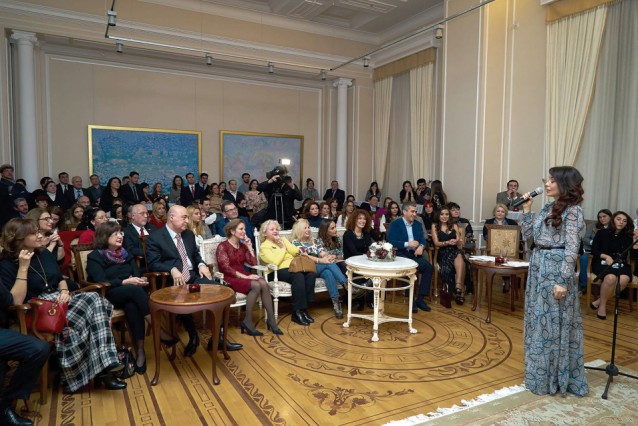Catching her just one day before her flight to London, the unstoppable force of the Azerbaijani poetry world Mrs Nigar Hasanzadeh quickly rearranged her schedule to sit down with Visions and relate the latest activities of the Söz Literary Project that she initiated with the Ministry of Culture and Tourism upon her return to Azerbaijan two years ago.
The cursor on the screen is blinking, urging me to start filling this ever more pronounced empty space in front of me. There is so much to be written and yet I am hesitating – after all this story is about someone who lives by words and who has mastered the art of them like no one else.
Interestingly, that white emptiness is something Nigar had to explore in her creative search for her own voice. If her life were to be looked at as a line, once in a while there would be bursts of spontaneous impulse that would radically change her otherwise settled life, sending that line in a completely new direction.
She dearly holds on to a notebook she kept from her childhood with her first attempts at writing. As if touching upon themes, trying her voice out, her rhymes started off very innocently, wherever her child’s imagination would take her. Then, during university, given the time, they became more patriotic, appearing first in school magazines and then gradually in other newspapers.
Before her 24th birthday, following one of her spontaneous bursts of intuition, she gathered all of her work and submitted it to the Writers’ Union. Her collection of poems was accepted and the chairman of the union, the prominent Azerbaijani writer Anar, later wrote a foreword to her first book, On Wings Over the Horizon, effectively launching her career as a poet.
From a blank canvas
As a person, she was a very ambitious young lady, a rebel even, as she refers to herself at one point. Poetry reading nights, conferences, literary events all became an inseparable part of her life until one day that very familiar voice of intuition brought her to her next life-changing moment – the decision to leave her previous life and dedicate herself fully to literature. She quit her job as a translator, stopped all her rising career activities and left on a one–year adventure to Europe. Mind you, what is now a normal craving of self-discovery for a creative individual was quite uncommon in Soviet Azerbaijan, especially for a young woman travelling alone.
 An evening of young poets, themed “Chaos,” organised by the Yug theatre and Söz. Vice President of the Heydar Aliyev Foundation Leyla Aliyeva (centre) also read her poems at the event. 1 April 2017
An evening of young poets, themed “Chaos,” organised by the Yug theatre and Söz. Vice President of the Heydar Aliyev Foundation Leyla Aliyeva (centre) also read her poems at the event. 1 April 2017
Back then it was just an action, without a clear understanding, just something that I felt the need to do. Now I understand it was more of a regeneration, a way that humans get to shed off the “old skin” and kind of start anew.
And while the sceneries outside of her windows changed from secluded monasteries in France to the foggy streets of London, inside there was emptiness, a white canvas that craved to be filled. It is the most incredible state – anticipating something new. You are absolutely aware of this stream of information that will engulf you at any moment... you don’t know what it is or what to do with it – but you know it’s coming.
She described her way of life then as very bohemian, dedicating all of her time to herself and her craft. It was a completely different life that allowed her to disappear inside herself, filling in the hollow spaces and re-emerging with new creations and energy. The tone, the themes, the words themselves were changing, growing, becoming wiser.
While walking one day in London, she saw an advert announcing that the British translator and poet Richard McCain would be reading translations of Anna Akhmatova. When the two talents met that evening, it inevitably sparked yet another burst in Nigar’s life – her poems were now being translated by Richard McCain himself!
A new whirl of events, completely different audiences, literary evenings organized now as a member of the Azerbaijani diaspora – her wanderings across Europe in search of her own voice gave results in the least expected geographical location – the Foggy Albion. It was the time in her life for unleashing the full potential of her creative nature, even though never in her wildest dreams did she imagine finding her voice abroad and receiving such a response to her poetry there. Referring to herself as an Azerbaijani Londoner writing in Russian, she chuckles and says, the black sheep syndrome has never left my side, but I feel pretty comfortable with it. I enjoy being different.
Poems are spontaneous. Like a dandelion seed that flies for the longest time until it finds good soil to be planted in, she said. But in her case, although referring to herself as not a very disciplined writer, the dandelion seed must have found its soil because following the translation of On Wings Over the Horizon –which back home in Azerbaijan received the prestigious Khumay award from the Azerbaijan National Academy – she published further collections of poems: Under the Foreign Clouds in 2004, Silver in 2007 and later, in 2012, a fairy tale written in the form of a poem called The Little Fairy Teller and the White Bird Nara.
To finding her word
She visited her homeland once a year, and her appearance in Azerbaijan two years ago was meant to be of a similar nature, solely a short-term visit, a sort of introduction to his homeland for her newborn son, Amir. As she poetically put it, I wanted him to breathe in the air of his motherland, to feel its atmosphere.
She doesn’t believe in coincidences, so when she was invited for a meeting with the minister of culture, Abulfaz Qarayev, and was offered to work on a literary project, Nigar perceived it as yet another wink of fate. She accepted it with great enthusiasm, setting a goal to create something that would be unlike anything ever done before. And indeed almost instantly there was a great response to this platform for talented writers and poets, where anyone could submit their work and, after being selected by a committee, read an excerpt at a literary evening. Given the meaning and importance she has placed on words, it’s no wonder the name of the project – Söz (Azerbaijani for “word”) – was decided on almost instantly.
I think it’s a great gift to the creative literary youth of Azerbaijan. 10-20 years ago, I myself would’ve loved such an opportunity to share my work with people directly involved with the craft.
I wonder what the ultimate goal of Söz is– giving opportunity to budding writers or finding the next greatest literary talent? It’s to give a platform to the ones who have that spark in them, said Nigar. There is no particular formula by which a worthy work is chosen among the dozens submitted, only a feeling, a pause after reading a paragraph or a line that really touches the soul.
Söz has become a place where creativity blooms, attracting everyone from ages 17 to 35 who may be in possession of a piece of literary inspiration. Recently the rows of writers and poets received their youngest member, Asker Novruzov, who is only 11. Writing since the age of nine, something about him caught Nigar’s eye and he became the youngest participant invited to perform at a Söz literary evening. That was before his mother tentatively mentioned that he is related to the great Azerbaijani poet, Huseyn Javid.
You instantly see that spark if there is one and all that is left to do is add more air and the flame will start by itself. What they’re going to do with it (if anything) is up to them.
And rediscovering her homeland
After so many years abroad, coming back to Azerbaijan was far from easy, but her incredible desire to create something real and useful from her very first, almost blindly taken, tentative steps have brought her to this growing community of poets, showering her with their gratitude and positive energy.
If it wasn’t for the kind people around me and Söz, none of this would’ve been possible. I have rediscovered my motherland as I haven’t known it before. This mechanism is moving, which means it wasn’t started in vain. Today, with the help of our platform, people’s fates are changing right before their own eyes; doors to the future are opening to a lot of talented young people.
Nigar has found her niche, a space where she is capable of causing a positive change where only two years ago there was only silence. It is all due to the initiative, kind wishes, enthusiasm and talent of all those who are directly involved with the project.
 Another event organised by Söz was a meeting with Rasim Balayev, an Azerbaijani and Soviet actor and Peoples’ Artist of the Azerbaijani SSR
Another event organised by Söz was a meeting with Rasim Balayev, an Azerbaijani and Soviet actor and Peoples’ Artist of the Azerbaijani SSR
Now, every month, whether in an old caravanserai, the temple of fire worshipers in Ateshgah or surrounded by carpets in the curious building of the Carpet Museum, different charismatic venues of Baku are being filled with interacting poets, writers and literature lovers sharing their work and energy. She has created a much-needed creative outlet for young writers and something to look forward to for cultured audiences.
Leaving Azerbaijan at 24, she was looking for herself, the energy that would fill the hollow spaces inside. This journey has not only led her back to her motherland, but also brought her back completely reborn.
All those stages, all those bursts and impulses were the steps of the ladder that brought her to her ultimate vocation in life, where in the eyes of her platform’s growing community she finds that energy that she longed for all this time.
Before, her dedication to the literary world was purely for the purposes of her own spiritual enrichment, whereas now she finds more joy and satisfaction from creating opportunities for talented young people. These are the opportunities she sought when setting off on that journey of hers in the first place.
This is my third year in Azerbaijan and now leaving is not even an option. The life that I have now I have fallen in love with so much that when I look back at myself 10 years ago, I don’t take that Nigar seriously. What I do today is beyond my personal interests, I do it to enjoy the changes that with the help of God and kind people I am able to initiate.






